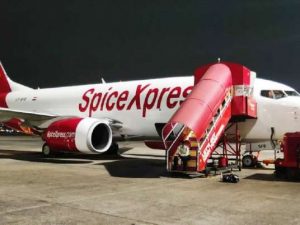Shiprocket, joined hands with Dependo, a growing logistics service provider, in a strategic partnership to enable Indian merchants with intercity same/next-day delivery. The partnership between Shiprocket and Dependo opens new avenues for Indian merchants, empowering them to offer efficient and swift intercity same/next-day delivery services. The collaboration takes advantage of Dependo’s courier network, which offers widespread coverage in major cities, ensuring smooth connectivity for a wide range of merchants. For SDD-NDD, courier partner’s presence is in all major metropolitan areas such as Mumbai, Delhi NCR, Bangalore, Hyderabad,Kolkata , Jaipur , Chennai and Pune . Speaking about the partnership, Saahil Goel, co-founder and CEO of Shiprocket, said, “We look forward to the strategic collaboration with Dependo, which holds significant promise for the eCommerce landscape in India. Through this partnership, Shiprocket and Dependo are committed to enhancing intercity same- or next-day delivery, presenting a transformative solution for merchants and customers. This collaboration is in line with our dedication to advancing the eCommerce sector and delivering exceptional services to Indian businesses. Together, our goal is to redefine delivery standards and offer sellers a streamlined and expedited shipping experience in key cities.” Sellers can now avail of next-day delivery from Delhi to Agra, Ambala, Chandigarh, Jaipur, Kanpur, Lucknow, Meerut, Ludhiana, and Dehradun. Additionally, Bangalore sellers can reach Hyderabad and Chennai within the next day, while Mumbai sellers can seamlessly connect with Pune. This collaboration reinforces Shiprocket’s dedication to providing cutting-edge solutions that transform the eCommerce landscape in India. “Collaborating with Shiprocket’s expansive network, coupled with our logistics expertise, is set to redefine intercity same/next-day delivery. This partnership signifies a powerful fusion of strengths, and we anticipate it will bring unparalleled efficiency and convenience to …
Read More »SpiceXpress, Star Air partner to expand domestic cargo network
SpiceXpress, a subsidiary of SpiceJet, has entered into a partnership with Star Air, to manage the belly space capacity for cargo transportation in Star Air’s fleet of nine aircraft. Star Air, operating five Embraer 145 jets and four Embraer 175 jets, will significantly enhance SpiceXpress’s domestic network, incorporating nine new destinations: Belagavi, Bhuj, Kalaburagi, Kishangarh, Kolhapur, Jamnagar, Jodhpur, Nagpur, and Shivamogga. This collaboration underlines SpiceXpress’s commitment to expanding its reach and strengthening the nation’s air cargo infrastructure, aligning with SpiceJet’s mission to cater to the underserved regions in India. SpiceXpress’s domestic network will increase from 39 to 48 destinations helping the company strengthen its Door-to-Door delivery and postal service. The three-year agreement, extendable by mutual consent, establishes a foundation for seamless cooperation between the two companies. Jai Singh Sadana, Chief Business Officer, SpiceXpress, said, “This partnership with Star Air marks a significant milestone for SpiceXpress as we broaden our domestic cargo network. The extended reach to these nine destinations aligns with our vision of connecting underserved regions, contributing to economic development, and bolstering the logistics landscape in India.” “The collaboration not only grants SpiceXpress access to additional delivery points and increased daily cargo volume but also enhances our last-mile presence. Door-to-door connectivity will now be extended to pin codes that were previously untouched, showcasing the transformative potential of this partnership,” Sadana said. Capt. Simran Singh Tiwana, Chief Executive Officer, Star Air, said, “Star Air is happy to announce this exciting partnership with SpiceXpress. The flexibility gained through this alliance empowers Star Air to unlock the cargo potentials in Tier-2 and Tier-3 cities across the country. This strategic partnership exemplifies the commitment of both airlines to redefine India’s cargo landscape and …
Read More »Celebi to offer ground handling services to British Airways at Chennai International Airport
Çelebi India announced its collaboration with British Airways to provide top-notch ground handling services at Chennai International Airport. This partnership marks a significant milestone for Çelebi as it expands its presence in the country with exceptional services in the aviation industry. British Airways, renowned for its exceptional service and unwavering commitment to safety standards, has chosen Çelebi India as its ground handling service provider in Chennai. This strategic alliance signifies the trust and confidence British Airways places in Çelebi’s expertise from 65 years of providing ground handling services to some of the world’s biggest airlines. Tauseef Khan, CEO, Çelebi Ground Handling – India, said, “We are thrilled to announce our partnership with British Airways as the chosen ground handling service provider at Chennai Airport. This collaboration is a significant milestone, underscoring Çelebi’s commitment to delivering top-tier services and contributing to the growth of India’s aviation industry. As we extend our support to British Airways, we remain dedicated to providing seamless and sustainable ground handling solutions, further solidifying our position as a trusted partner in the aviation landscape.” This collaboration with British Airways is part of Çelebi India’s expansion strategy, adding to its operations at major airports, including Mumbai, Delhi, Bengaluru, Goa, Hyderabad, Cochin, Ahmedabad, and Kannur.
Read More »Digitalisation Revolutionizing the Indian Logistics Landscape
Authored by Harshit Shrivasttava, CEO & Co-founder of Intugine The Indian logistics industry is experiencing a digital transformation that has the potential to reshape our understanding of supply chain management. With ongoing challenges to the industry’s adaptability and resilience, a push towards heightened efficiency and reduced costs has become increasingly urgent. As the backbone of the nation’s economic landscape, the logistics sector is poised for growth, contributing 14.4% to India’s GDP and employing over 20 million people. This article explores the potential evolution of digitalization in the Indian logistics ecosystem outlook and its impact on the industry’s future. The year 2023 heralds the arrival of the National Logistics Policy, a model of India’s relentless resolve to optimize operational facets and wholeheartedly embrace the wave of technology-driven solutions. This strategic blueprint is poised to strengthen the nation’s economic terrain, catalyzing amplified connectivity and facilitating frictionless trade in domestic and international markets. It is a testament to India’s commitment to not merely adapt to the evolving outlook but to lead the charge in supply chain transformation. Once considered a fleeting trend, digitalization has become an indispensable cornerstone of the Indian logistics sector. The industry is grappling with a plethora of complexities, ranging from the vast and diverse geography of the nation to complex regulatory demands and varying infrastructure standards. These challenges underscore the imperative for a profound digital revolution. Leveraging robust technologies such as automation, integration with the Internet of Things (IoT), and harnessing the power of data analytics, logistics companies stand to elevate their operational capabilities significantly. The merits of this transformation are manifold. Automation is central to eliminating manual errors, guaranteeing seamless operations in a geography where customer expectations have …
Read More »Geodis to continue operate own freighter capacity using A330-300P2F
Geodis will continue to offer its own-controlled freighter capacity until the end of the year. The freight forwarder’s leased Airbus A330-300P2F, operated by London Stansted-headquartered Titan Airways, is currently performing three rotations per week between the UK and China, carrying e-commerce goods. Titan is operating a round-trip cargo route from Chongqing Jiangbei International Airport in southwestern China to London Stansted Airport in the UK three times a week on Tuesdays, Thursdays and Saturdays. The aircraft will continue to be operated “at minimum until the end of 2024,” said Eric Martin-Neuville, vice president of freight forwarding, Geodis,” says reports. The aircraft was leased during the height of the pandemic, but the tough market conditions last year resulted in a lot of doubt about how the return of capacity and lower rates would affect those in the industry that had invested in own capacity, especially on long-term contracts.
Read More »‘Public-private partnerships to drive investments in cargo infra, tech, logistics biz’
Public-private partnerships are being encouraged to drive investments in cargo infrastructure, technology, and logistics solutions, says M Afzal Malbarwala, MD, Galaxy Freight. “This collaborative approach is pushing for innovation, bringing in expertise, and ensuring that the industry is well-equipped to meet the increasing demand for air cargo services,” he adds. “India’s ambition of achieving 10 million metric tons of cargo throughput by 2030 is not just about quantity; it also underscores a commitment to sustainable practices. Green initiatives, such as the adoption of cleaner fuels, energy-efficient technologies, and waste reduction measures, are integral to the country’s vision. By prioritizing sustainability, India aims to balance economic growth with environmental responsibility in its maritime activities.”
Read More »DP World signs MoUs worth INR 25,000 crores with Govt of Gujarat to develop ports, terminals,SEZs
DP World has signed multiple MoUs worth INR 25,000 crores (INR 250 billion) with the Government of Gujarat, covering the development of new ports, terminals, and economic zones, strengthening its commitment to supporting trade in a growing Indian state. Signed at Gandhinagar, during Vibrant Gujarat Global Summit 2024, the MoUs highlight Gujarat’s prowess as a role model of development and the Growth Engine of the nation while leveraging its logistics and maritime infrastructure. DP World Group Chairman and CEO, Sultan Ahmed bin Sulayem exchanged MoUs around potential investments in Gujarat with M K Das, Additional Chief Secretary, Government of Gujarat in the august presence of His Highness Sheikh Mohamed bin Zayed Al Nahyan, President of UAE, and Shri Narendra Modi, Honourable Prime Minister of India, as part of the summit in Gandhinagar. The MoUs underscore DP World’s commitment to facilitating trade in Gujarat by developing: • Multi-purpose deep-draft ports in South Gujarat and around the western coast of Gujarat towards Kutch, • Special Economic Zones in Jamnagar and Kutch, • Gati Shakti Cargo Terminals (GCT) and Private Freight Stations at Dahej, Vadodara, Rajkot, Bedi and Morbi DP World has also signed an MoU with Gujarat Maritime Board to jointly identify opportunities to develop additional ports along the coast of Gujarat. Commenting on the signing of the MoUs, Sultan Ahmed bin Sulayem, DP World Group Chairman and CEO, said, “We are very committed to India, where we have been operating for nearly 20 years. In that time, we invested almost $2.5 billion and we are going to invest more in the next 3 years in these projects. The policies of the government and our experience here is what gives us the …
Read More »Air Canada appoints Group Concorde as GSA in India
Group Concorde has announced its recent partnership with Air Canada Cargo. The collaboration began on January 1, 2024. Starting the new year on a high note, Group Concorde will assume the pivotal role of the Indian sales representative for one the largest North American carriers with operations from India. Prithviraj Chug, CEO of Group Concorde, expressed his enthusiasm about the collaboration, saying, “Air Canada Cargo is renowned for its expansive fleet, vast network, and class-apart service. We are excited about the opportunities this partnership brings, as we look forward to extending our services. This collaboration will not only strengthen our position in the market but also enrich the logistical experience of our valued customers.” Group Concorde, Air Canada Cargo will continue to move freight on their flights from India as well as from Interline Partner network.
Read More »Air Cargo India to unlock opportunities for global air cargo community
Block your calendar for Air Cargo India 2024 which is set to be held in Jio World Convention Center, Mumbai, from 14th till 16 February 2024. Organised by Messe Muenchen India, the show will leverage the platform’s inherent strengths of enabling networking, collaborations, knowledge exchange, sharing, and celebrating successes, this edition will once again unlock opportunities for the global air cargo community. Currently, the air cargo business in India is one of the most competitive and fastest-growing segments. Research & Markets estimates that by 2028 India’s air freight market will reach $17.22 billion, growing at a CAGR of 5.65%. Bolstered by a strategic focus on infrastructure development of airports, logistics parks, and road connectivity projects across the country, combined with the production-linked incentive (PLI) scheme covering 15 manufacturing sectors, India will witness surging volumes of air cargo operations across the country.
Read More »Customs must facilitate trade and offer seamless solutions
Customs Brokers were encouraged to provide end-to-end solutions to the importers and exporters by providing the trade facilitation measures introduced by the customs department. Stress was also laid on sustainability at Brihanmumbai Custom Brokers Association’s (BCBA) 87th Founders’ Day. Surjit Bhujabal, Member Customs, CBIC New Delhi highlighted BCBA as a strong link between the members, Customs and other stakeholders. He appreciated the BCBA’s critical role in supporting in implementing CBLMS as well as imparting training and skill development. Principal Chief Commissioner of Customs, Mumbai Zone I, P.K. Agrawal also complimented the Custom Brokers who have served the trade through decades and encouraged the next Gen to continue with the same zeal. He stressed the importance of sustainability as a responsibility towards the environment and future generations. Unmesh Wagh, Deputy Chairman, JNPA, gave an impactful speech pointing out to the Customs Brokers about their increasing importance in the future. He appreciated BCBA’s active involvement in imparting training and skill development and orientation for the upcoming Vadhvan Port and valued the partnership in facilitating trade friendly environment. Rajesh Pandey, Chief Commissioner of Customs, Mum Zone II acknowledged the vital role played by BCBA in advocating Compliance and spreading awareness about the best trade practices amongst its’ members. He congratulated BCBA on this momentous day and requested the continued co-operation in actively highlighting the issues so it can be addressed to benefit all.
Read More » Cargo Breaking News
Cargo Breaking News









